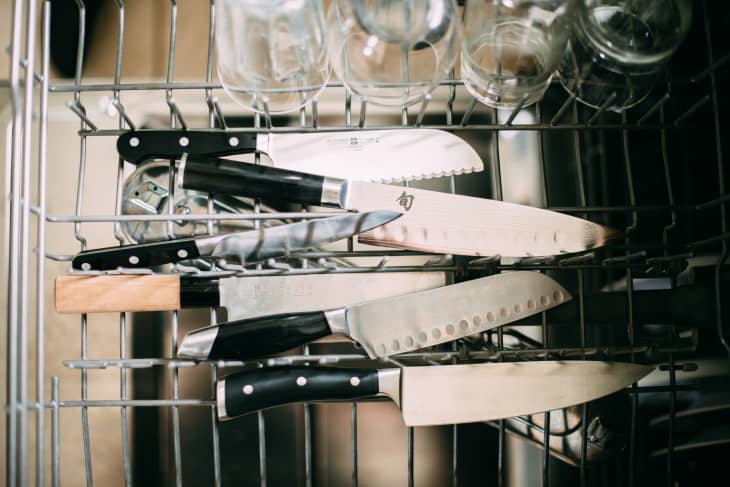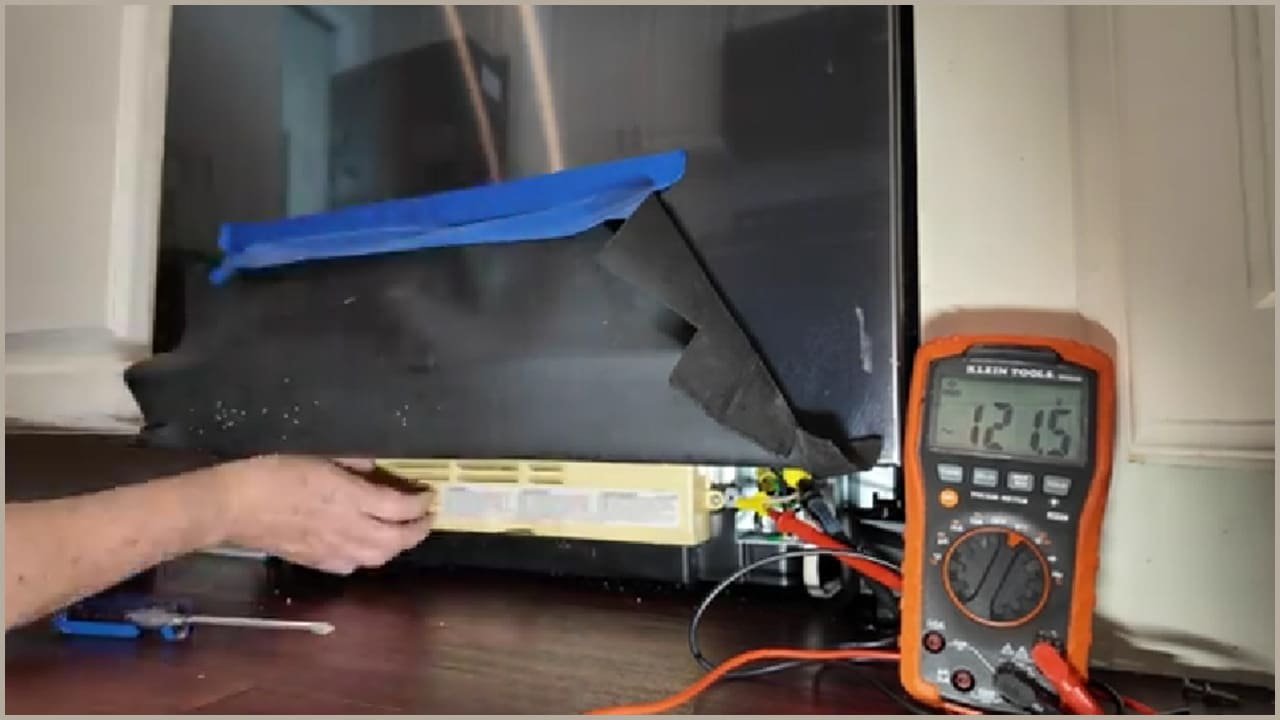Chef knives should not go in the dishwasher as it can dull the blades and damage handles. The heat and detergent are too harsh for the delicate edges.
Placing chef knives in a dishwasher exposes them to conditions that compromise their performance and longevity. Harsh detergents, coupled with the high heat and humidity within a dishwasher, can cause the blade to corrode and handles to warp or crack.
Knives are precision tools, and the dishwasher’s jostling can lead to dulled edges, making them unsafe and inefficient for cutting. Hand washing with mild soap and drying immediately keeps them sharp and extends their lifespan. A well-maintained chef knife is an essential tool in any kitchen, ensuring precise cuts and safe food preparation. Proper care involves avoiding the damaging effects of dishwashing, guaranteeing that your investment in high-quality knives pays off in the long run.
Table of Contents
The Edge Of Perfection
Every chef knows the heart of their kitchen beats to the rhythm of sharp knives. The quest for the perfect edge is not just about skill—it’s about preserving the tool that makes the magic happen. A blade’s sharpness is crucial to the fine art of cooking, affecting everything from the texture of a slice to the flavor of a dish.
Why Sharpness Matters
The sharpness of a chef knife is the linchpin of its performance. A dull knife can crush delicate ingredients, affecting their appearance and taste. Moreover, sharp knives make prep work quick, safe, and satisfying, allowing chefs to glide through tasks with precision and ease. Here’s why maintaining that edge is key:
- Accuracy: Sharp knives offer control to ensure every cut is just right.
- Efficiency: Less force is needed, reducing prep time.
- Safety: A sharp blade is less prone to slipping off food and causing injury.
Risks To The Knife Edge In The Dishwasher
Placing chef knives in a dishwasher is a gamble that often comes at the expense of their sharpness. The harsh environment poses several risks:
| Risk Factor | Impact on Knife Edge |
|---|---|
| Heat: | It can warp the steel, ruining the blade’s alignment. |
| Harsh Detergents: | Chemicals can corrode and dull the cutting edge. |
| Water Pressure: | Strong jets can cause knives to knock into each other, causing chips or nicks. |
For these reasons, experts advise against dishwashing knives. Hand washing ensures the edge stays razor sharp, ready for its next culinary adventure.
A Dive Into Dishwashing Dangers
Embarking on ‘A Dive into Dishwashing Dangers’ reveals why professional chefs and cooking enthusiasts cringe when they see a chef knife in the dishwasher. This seemingly harmless practice can significantly shorten the life of your prized kitchen tool. Let us cut into the facts.
The Harsh Environment Inside A Dishwasher
The dishwasher’s interior might clean your plates, but it’s no place for chef knives. Here’s why:
- Jostling Movements: When the water jets hit, knives can shift and bang into other items.
- Extreme Temperatures: The heat can warp knife handles, impairing their balance and grip.
- Extended Moisture Exposure: Sitting damp can lead to rust and corrosion on a blade’s edge.
Chemical Warfare On Blades
Dishwasher detergents are designed to combat tough food residues. Unfortunately, they don’t go easy on chef knives:
| Detergent Component | Impact on Knives |
|---|---|
| Abrasives | Scratch and dull the blade’s surface. |
| Chlorine | Accelerate staining and rust formation. |
| Harsh Chemicals | Degrade knife materials, reducing longevity. |
Remember: a little care goes a long way in keeping your chef knives in slicing perfection. Hand wash them gently with mild soap and warm water, and cherish the chefs’ choice for years to come.
Material Matters
Understanding why chef knives should stay out of the dishwasher requires a grasp of Material Matters. High-quality knives are crafted with materials that demand care. Two key components suffer in the harsh environment of a dishwasher: the handle and the blade itself.
The Impact On Knife Handles
Knife handles endure great stress in a dishwasher. Water jets and high temperatures cause materials to warp, crack, or even separate from the blade. Wood handles absorb water, leading to swelling and eventual decay. Synthetic materials are not safe either; they might resist water but can deteriorate with the heat. This not only ruins the handle’s integrity but also the knife’s balance, essential for precision work.
Blade Materials And Dishwasher Doom
The blade is the heart of any chef knife, and dishwasher conditions spell doom for them. Stainless steel might seem indestructible, yet the truth is different. Prolonged exposure to water and detergent causes corrosion and dulls the edge. Carbon steel blades have it worse, rapidly rusting in such damp conditions. The collision with other utensils can damage the fine edge your blade once had. Protect your investment; keep those knives far from the dishwasher.
| Material | Effect of Dishwasher |
|---|---|
| Wood Handles | Swelling, cracking, decay |
| Synthetic Handles | Deterioration, loss of balance |
| Stainless Steel Blades | Corrosion, dulling of edge |
| Carbon Steel Blades | Rapid rusting, edge damage |
Heat And Harm
Heat and Harm – two factors that threaten the life of your beloved chef knives when they take the perilous journey through the dishwasher. Exploring the steamy underworld of this common kitchen appliance reveals why it’s a battleground for your culinary blades. Let’s dive into the science behind this and spare your knives the harsh ordeal.
Thermal Stress And Metal Fatigue
Thermal stress impacts your chef knives every time they undergo rapid temperature changes in a dishwasher. Picture this: your cold knife enters a hot, humid environment…and it’s stress at first heat! This sudden shift can cause microscopic warping and fractures.
Metal fatigue follows suit. The relentless cycle of heating and cooling acts like a workout for the metal, tiring it out over time. This leads to dull blades and even the dreaded snapping of the knife. Avoid these woes by hand washing your knives in gentle water temperatures.
How Heat Affects Knife Construction
In a dishwasher, heat does more than just clean dishes. It tampers with your chef knife’s construction. Understand that the bonding between the handle and the blade can weaken. Glues soften, and plastics can warp, causing the handle to become loose or even come off.
- Kitchen knives feature delicate edges designed for precise cuts. Dishwasher heat dulls these edges.
- The tang, the part of the blade that extends into the handle, can also get compromised.
Hand wash to preserve the integrity of these elements. Your knife’s lifetime directly ties to the care it receives. Be kind to your knives, and they will be kind to your cooking.
Bumpy Rides
Think of the dishwasher as a theme park for dishes, rough and fun, but not for your chef knives. The ‘Bumpy Rides’ in a dishwasher can spell doom for these fine tools.
Jostling And Impact: The Dishwasher’s Tumble
Knives hate the wild ride. In the dishwasher, your chef knives can get bumped around. They bang against other items. This can cause chips or dents. It’s like putting a sports car in a demolition derby. Not a good idea, right?
- Collisions are bad for the blade. They lead to dullness and damage.
- Sharp edges may nick other objects, ruining more than just the knives.
- The jostling can loosen handles or pop rivets. That’s a safety hazard.
Keeping The Edge Aligned And Intact
Think of your knife edge as a delicate line of soldiers; any misstep can break their ranks. Alignment is key to sharpness. The dishwasher throws knives into chaos.
Hot water and strong detergents can corrode the blade. This dulls the edge. A blunt knife is a chef’s nightmare.
| Do’s | Don’ts |
|---|---|
| Hand wash gently | Throw in dishwasher |
| Use mild soap | Expose to harsh chemicals |
| Dry immediately | Leave to air dry |
Store knives in a block or on a magnetic strip. This keeps the edge aligned. And remember, a well-cared-for knife is a chef’s best friend.
:max_bytes(150000):strip_icc()/Is-It-Safe-to-Wash-Knives-In-Your-Dishwasher-2000-3c092e4f2b314be3bff3e9f1b7fc3cd4.jpg)
Credit: www.eatingwell.com
Dulling By Cleaning
Chef knives need special care for long-lasting sharpness. Putting them in the dishwasher might seem like a good idea. Surprise! That could actually harm them. Discover why this common cleaning method is a no-no for your precious blades.
The Paradox Of Dishwashers And Sharpness
Dishwashers promise cleanliness and convenience, yet they can dull your chef knives over time. The intense environment inside the dishwasher can be detrimental. The motion, heat, and moisture can lead to knives rubbing against other items. This constant clashing can blunt your knife’s edge, transforming sharp into dull swiftly.
Dishwasher Detergents: Friend Or Foe?
It’s easy to think detergents just clean, but the truth is, they pose risks to knife sharpness.
- Harsh chemicals in detergents can cause corrosion, eating away at the metal.
- Detergents also leave small scratches on the blade’s surface. Over time, these scratches add up, leading to dullness.
To maintain a sharp blade, hand wash your chef knives with gentle soap and water. Immediately dry them with a soft towel. This routine keeps knives in top shape, ready for your next culinary challenge.
Caring For Your Culinary Companions
Caring for your culinary companions is not just about keeping them shiny and sharp. It’s about preserving the life and performance of some of your most dependable kitchen tools. Your chef knives work hard to help you create those precise cuts and perfect dices, so it’s essential to treat them with respect and care.
Best Practices For Knife Maintenance
Keep your blades at their best with some fundamental knife care rules:
- Store knives properly in a knife block or magnet strip.
- Avoid cutting on hard surfaces; use wooden or plastic cutting boards.
- Sharpen regularly, using a whetstone or honing rod.
- After use, clean promptly and dry your knives thoroughly.
Hand Washing: A Blade’s Best Friend
Dishwashers can be harsh on your knives’ edges and handles.
Here’s why hand washing is essential:
- Avoids harsh detergents that can dull the blade.
- Prevents banging against other utensils, protecting the edge.
- Ensures handle materials don’t warp or crack.
- Maintains sharpness and extends your knife’s life span.
Use warm water, mild soap, and dry immediately with a soft cloth. Proper care ensures your knives remain your trusted culinary companions for years to come.

Credit: www.reddit.com
The Lifespan Of Your Chef Knives
The lifespan of your chef knives could be a testament to your culinary adventures. Just like every craftsman treasures their tools, a chef’s knives are the extension of their hands. Proper care can ensure they last for a considerable time, slicing and dicing effortlessly. But, how long can a well-cared-for knife actually last, and what are the effects of dishwashing on a knife’s life?
Predicting The Longevity Of Well-cared Knives
Consider your chef knives as lifetime companions in the kitchen. With meticulous maintenance, they can often outlast most kitchen gadgets. A well-crafted chef knife can last for decades, making it a worthwhile investment for both professional and home cooks. Every knife has an expected lifespan, but the actual longevity depends on several factors. Quality materials, proper use, regular sharpening, and safe storage contribute to the extended life of a knife.
- Material Quality: High-carbon stainless steel resists rust and keeps an edge longer.
- Usage: Knives meant for specific tasks stay sharper.
- Sharpening: Regular honing and occasional professional sharpening maintain the edge.
- Storage: Using a knife block or magnetic strip prevents unnecessary wear.
Consequences Of Dishwashing On Knife Life
Most chefs vehemently advise against putting knives in the dishwasher. The harsh environment inside a dishwasher can be detrimental to your knives’ health.
| Consequence | Reason |
|---|---|
| Dulls the Edge | Jostling against other utensils can blunt the blade. |
| Corrosion | Detergents and high humidity can cause rust and pitting. |
| Handle Damage | Heat and moisture can warp or crack the handle. |
Caring for knives by hand washing with mild soap and water maintains their performance and appearance. Quick drying and prompt return to a safe storage place ensure the knives remain ready for the next culinary challenge. Respecting the limitations of chef knives and avoiding the dishwasher will contribute to a lengthier and more productive life for your most trusted kitchen tool.
Safety Concerns
Keeping your chef knives sharp, clean, and safe requires proper care. Dishwashers can pose a risk to both your knives and your safety. Let’s dive into why manual care is a must for these kitchen essentials.
Risk Of Injury From Improper Care
Knives in the dishwasher are a hidden danger. Tucked among plates and silverware, they can cause unexpected cuts when unloading. The high water pressure and harsh detergents can dull the blade, making it more prone to slip and possibly causing injury during use. It is crucial to treat these tools with respect and care to prevent accidents.
Safe Storage And Handling
- Always hand-wash chef knives right after use.
- Dry them immediately to prevent rust and corrosion.
- Use a knife block or magnetic strip for storing.
- Keep knives out of reach of children.
Avoiding the dishwasher also means your knives stay sharper longer, ensuring they’re ready for the next culinary task. Follow these steps to ensure a safer kitchen environment.
The Chef’s Plea
The Chef’s Plea: Treat your chef knives with care. A plea rings out from professional kitchens around the globe. It speaks of honoring the blades that craft their art. The message is clear: Keep chef knives out of the dishwasher. Follow this crucial advice to maintain your precious tools.
Professional Chefs On Knife Care
Culinary experts agree: Proper knife care is vital. The tumultuous environment in a dishwasher is no place for a chef’s knife. Harsh detergents, banging against other utensils, and high heat can all cause damage. The edge dulls, the handle weakens, and a once mighty blade falls into disrepair. A blunt knife is unsafe. It requires more force to cut, increasing the risk of injury.
Recommended Alternatives To Dishwashers
Preserve your knives with hand washing. It’s simple and effective. Use warm, soapy water and a soft sponge. Dry your knives immediately with a towel. Proper storage is also key. Use a knife block or a magnetic strip. These methods extend the life of your knives and keep them sharp and ready for action.
- Hand wash with care: Gentle soap and warm water will do the trick.
- Dry thoroughly: Prevent water spots and rust.
- Store safely: Use a block or magnetic strip. Avoid tossing knives in a drawer.
Embracing these alternatives means your tools will serve you well for years to come.
Economizing Your Kitchen Investments
Your kitchen is a hub of valuable tools, and your chef knives stand out among them. These knives are more than just utensils; they’re an investment in your culinary passion. Proper care ensures they remain in top-notch condition, stretching your dollars further.
Cost-effectiveness Of Proper Knife Care
Paying attention to knife care isn’t just about maintaining sharpness; it’s about being smart with your money. Placing chef knives in a dishwasher can lead to costly consequences. Dishwashers can cause knives to bump against other items, dulling the edge. Over time, this means more frequent sharpening or, worse, purchasing new knives before it’s necessary.
- Hand washing preserves the blade’s sharpness.
- Use gentle soap and warm water for cleaning.
- Always dry immediately to prevent rust.
Saving money on unnecessary replacements starts with these simple steps. They keep knives in prime condition for years, deferring the need for new purchases. It’s a practical approach that benefits your wallet and your cooking experience.
Avoiding Premature Replacements
Dishwashers introduce knives to harsh conditions. Heat, moisture, and chemicals from detergent can damage handles and blades. This means you’ll have to replace them sooner than you’d like.
| Dishwasher Effects | Manual Care Benefits |
|---|---|
| Dulls blade edges | Maintains sharpness |
| Causes rust and corrosion | Prevents rust with proper drying |
| Damages handle material | Keeps handles sturdy and intact |
Being vigilant with knife maintenance extends their lifespan. Quality knives can last decades with proper handling. Side-stepping premature replacements not only makes culinary activities more delightful but also keeps your investments worthwhile.
Myths Of Convenience
The idea that dishwashers are the ultimate solution for cleaning all kitchen utensils persists. Yet when it comes to your chef knives, this ‘Myths of Convenience’ could be doing more harm than good.
Debunking Dishwasher Myths For Knives
Many believe dishwashers are the safe bet for a quick clean. However, this is not true for chef knives. Here are some myths and the truth behind them:
- Dishwashers save time: They might seem faster, but the time you spend sharpening or even replacing knives adds up.
- Dishwashers are gentle: The reality is harsh detergent and hot water can dull your knives quickly.
- Knives are dishwasher-safe: Most manufacturers advise against it. Chef knives can get damaged.
The True Time-savers For Kitchen Tools
For lasting sharpness, cleaning knives by hand is best. Follow these quick steps:
- Wash with mild soap and warm water.
- Rinse the blade carefully.
- Dry immediately with a towel.
- Store properly in a knife block or case.
These steps keep your knives ready and reduce the need for frequent sharpening.

Credit: www.thekitchn.com
Frequently Asked Questions
Is It Bad To Put Chef Knife In Dishwasher?
Putting a chef knife in the dishwasher can damage the blade and handle. Hand wash knives to maintain their sharpness and condition.
Why Does He Not Recommend Washing Your Knives In The Dishwasher?
He advises against dishwasher cleaning because it can dull knives, cause rust, and damage handles. Hand washing preserves the blade’s sharpness and overall longevity.
When Your Knife Is Dirty It Is Okay To Submerge A Knife In Your Dishwasher?
It’s generally not recommended to put knives in the dishwasher, as it can dull the blade and damage the handle. Hand wash knives instead to maintain their sharpness and integrity.
Why Can’t Ceramic Knives Go In Dishwasher?
Ceramic knives should not go in the dishwasher due to the harsh environment. The intense heat and strong detergents can dull the blade, while jostling can cause chipping. Hand washing preserves their sharpness and integrity.
Bottom Line
Maintaining chef knives demands proper care. Hand washing preserves their sharpness and longevity. The dishwasher risk—blunt edges and corrosion—is clear. Protect your investment; embrace the wash-by-hand ritual. Your culinary tools will thank you with consistent, precise cuts for years to come.



